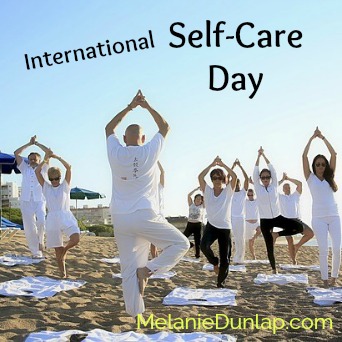When he showed me the picture I let out a shriek and turned away. Maybe it was a little dramatic, but I had a different picture in my mind. You see the picture was of me. I was in the middle of a flowing creek having what felt like a Zen moment to me, but the picture showed a goofy looking woman wearing ill-fitting clothes obviously meant for comfort rather than style and sporting a bright yellow case to hold the cheater glasses she now needed to carry everywhere.
It was not at all Zen like.
Once the shock wore off and I realized how judgmental I was being I looked at the picture again. Maybe it wasn’t Zen, but the picture was of a woman relaxed and recharging.
That was the point.
You see I was getting a jumpstart on International Self Care Day.
Yes, International Self Care Day. It’s a thing.
The International Self-Care Foundation (ISF) has designated July 24th as International Self-Care Day to symbolize that self-care is beneficial 24 hours a day, 7 days a week (24/7). My trip up the creek was just a few days before that.
While self-care may sound like a new age idea made up by a crystal waving, incense burning healer, its importance was recognized as far back as ancient Greece. Seen as an integral part of democracy, the ancient Greeks thought that self-care was a necessary part of care for others. It made you a better, more honest citizen.
What is Self-Care?
Self-care is more than just a day at the spa, doing yoga or an occasional cleanse. It is about knowing your body, educating yourself on how it works and planning for its good health.
This is how the ISF describes self-care:
Self-care is a practical, person-centered set of activities that we should all be doing to maintain our health, wellness and wellbeing. Through self-care people can be healthier and remain so into old age, managing minor ailments themselves. They can also better manage, delay or even prevent the appearance of lifestyle diseases such as heart attacks, strokes, diabetes and many cancers.
The World Health Organization (WHO) says that 70% of deaths worldwide are from the so-called lifestyle diseases. In the United States the proportion is even higher despite spending more per person on health care than any other country.
In 2015 the WHO commissioned a global study to determine risk factors for disease. The top 10 risk factors are:
- High blood pressure
- Smoking
- Overweight & Obesity
- Childhood undernutrition
- Diabetes
- Alcohol use
- Household air pollution
- Unsafe water
- Unsafe sex
- Low fruit consumption
The irony is that most lifestyle diseases are preventable with the right self-care.
How to Practice Self-Care
In the US we still treat self-care as a luxury or indulgence instead of the necessary part of health care that it is. Self-care is health care.
Most of us want to stay healthy as we age but are afraid of looking selfish when we do things for ourselves. Well here is your Permission to be Selfish, it includes 10 tips for self-care.
The best way to practice self-care is to make it a part of your routine. Schedule time in your day for meditation and exercise. Plan your meals and batch cook to make it easier to eat healthy. Make the necessary changes to reduce your stress. Educate yourself about your body and how it works.
Ask for help when you need it. Be willing to invest in yourself. Have fun.
Self-care was the reason I was in the creek that day. Science has confirmed what traditional healers have always known…nature is the best self-care.
This picture is proof you don’t have to look Zen to feel it.

